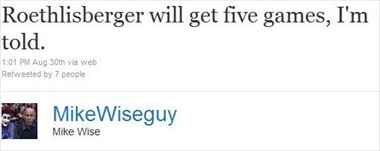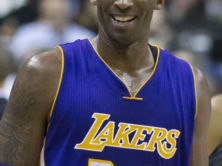
Mike Wise, a Washington Post sports writer, was suspended for the above tweet, a fake news update to an ongoing sports story. (Credit: Twitter)
Washington Post sports columnist Mike Wise was given a 30-day suspension after knowingly tweeting fake information. His Twitter bio identifies him as a columnist for The Post and he has more than 3,500 followers. Wise is just the latest of many reporters discliplined for their online postings. Others include The Washington Post’s Dave Weigel and CNN’s Octavia Nasr.
Wise tweeted a hoax message that Pittsburgh Steelers quarterback Ben Roethlisberger would be suspended for five games. (The Nevada Supreme Court is currently deciding if Roethlisberger will be sued in civil court after being accused of sexual assault, the Pittsburgh Post-Gazette reports. In April, Roethlisberger was given a six-game suspension “for violating the league’s personal conduct policy” after being accused of rape in Georgia, according to the Pittsburgh Tribune-Review.)
It wasn’t correct information, and he had intended the tweet to “comment on the lowered standards of accuracy for information shared on social media,” The Post’s ombudsman Andrew Alexander blogged Aug. 31. On his daily radio show, “The Mike Wise Show with Holden Kushner,” aired on the CBS-affiliated 106.7 sports radio, Wise described his intentions as an attempt “to showcase the absurdity of bad journalism.”
“Fabrication is a major journalistic transgression. He’s lucky he wasn’t fired,” Alexander opined. His suspension won’t “affect” his radio program, Alexander noted.
However, The Post’s media writer, Howard Kurtz, tweeted that he found the the suspension “overly harsh,” The New York Times noted.
But, instead, Wise is the one who ended up suspended, as he told listeners on his radio program Aug. 31.
“I’m paying the price I should for careless, dumb behavior in the multi-platform media world,” Wise said, announcing his month-long suspension “to think about the severity of my actions.” Wise called his tweet “a horrendous mistake” and noted that it “cost” him some of his credibility.
“Integrity, being right before being first, is the only thing genuine journalists have left in this world. It pains me to say my own stupid, irresponsible experiment, ironically, has cost me a chunk of my own credibility today,” Wise said.
Alexander reported that The Post’s sports editor Matthew Vita said Wise used “poor judgment” with the tweet and that he broke The Post’s “core principles.”
Wise tweeted Aug 30 that “Roethlisberger will get five games, I’m told.” He tweeted 47 minutes later that he “can’t reveal my sources,” just to tweet 13 minutes after that suggesting his source was a “Blackjack Dealer, Table 12, Harrah’s. It’s money, I promise.” According to The Washington Post’s Howard Kurtz, Wise intended to tweet a few moments after his initial tweet, clarifying that it wasn’t legitimate news, but his account was frozen.
He apologized via Twitter three hours after his first post saying that
“But, in the end, it proved two things: 1. I was right about nobody checking facts or sourcing and 2. I’m an idiot. Apologies to all involved.”
Vita sent a message to his sports staff as a result of Wise’s tweets, “reminding them of The Post’s rules on social media,” Alexander wrote. In that message, Vita emphasized accuracy and transparency in everything staffers do, even if it’s on social media sites like Twitter or Facebook.
Likewise, Columbia University digital media professor Sree Sreenivasan reminded that “a journalist’s reputation ‘is on the line with every tweet, for better or worse,'” according to The New York Times. Sreenivasen is also Columbia journalism school’s dean of student affairs.
Howard Kurtz, The Post’s media writer, explained that The Post’s social media policy was “adopted” last year after one of the Post’s two managing editors, Raju Narisetti, closed his Twitter account following a few “unwise” tweets.
According to Kurtz, Post policy requires that its journalists maintain objectivity, impartiality, the separation between news and opinion “and other hallmarks of our brand of journalism,” even on social networks. In ombudsman Andrew Alexander’s column last fall after Narisetti axed his Twitter account, Alexander included parts of the Post’s new guidelines concerning the “perception” problem” of social networks. See below:
- “When using these networks, nothing we do must call into question the impartiality of our news judgment. We never abandon the guidelines that govern the separation of news from opinion, the importance of fact and objectivity, the appropriate use of language and tone, and other hallmarks of our brand of journalism.”
- “What you do on social networks should be presumed to be publicly available to anyone, even if you have created a private account. It is possible to use privacy controls online to limit access to sensitive information. But such controls are only a deterrent, not an absolute insulator. Reality is simple: If you don’t want something to be found online, don’t put it there.”
- “Post journalists must refrain from writing, tweeting or posting anything – including photographs or video – that could be perceived as reflecting political racial, sexist, religious or other bias or favoritism that could be used to tarnish our journalistic credibility.”
Michael David Smith blogged for Fanhouse listing news outlets that picked up Wise’s original tweet — including the Miami Herald and Baltimore Sun. While Smith noted that Wise wanted to prove a point about media outlets picking up information without verification, Smith argued Wise didn’t prove anything:
“Everyone who passed along his Tweet sourced it properly, by attributing it to Mike Wise of the Washington Post. We just didn’t know how unreliable a source that was.”
iMediaEthics has written to Mike Wise and will update with any comment.






